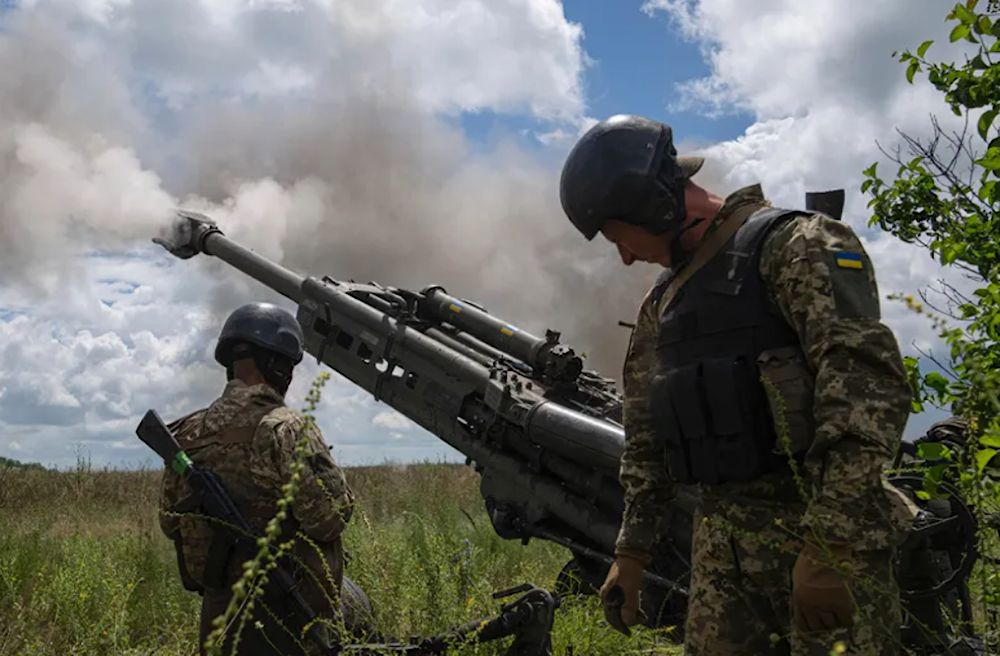US in talks with Turkey to buy explosives for Ukraine
The Pentagon stated last month that a Turkish defense contractor would help the US in developing munition lines in Texas capable of manufacturing 30,000 artillery shells per month by the end of next year.
-

Ukrainian servicemen fire at Russian positions from a U.S.-supplied M777 howitzer in Ukraine on July 14, 2022 (AP)
Bloomberg reported on Wednesday that the US is looking to acquire explosives from Turkey in order to increase artillery shell manufacturing amid a worsening ammunition shortfall in Ukraine.
According to the article, the US is most interested in the Turkish supply of trinitrotoluene, often known as TNT, and nitroguanidine, which are crucial components of 155mm artillery shell manufacture, as demand for the ammunition has increased dramatically over the last two years due to the situation in Ukraine.
The Pentagon stated last month that a Turkish defense contractor would help the US in developing munition lines in Texas capable of manufacturing 30,000 artillery shells per month by the end of next year.
The new Texas manufacturing lines are scheduled to manufacture roughly one-third of all US-made 155mm artillery shells by 2025, and the US Defense Department has already placed an order for 116,000 rounds of ammunition from Turkey's Arca Defense for delivery this year, Bloomberg detailed.
CNN previously cited NATO intelligence estimates that indicate Russia manufactures around 3 million artillery rounds per year, while the US and its European allies can only generate 1.2 million munitions yearly.
Since the onset of the war in Ukraine, Western nations have provided military and financial help to Kiev, something the Kremlin has repeatedly cautioned against, citing a further escalation of the issue.
Russian Foreign Minister Sergey Lavrov has warned that any container carrying weapons for Ukraine will be considered a suitable target for Russian attacks.
Congress 'looting from its army' to support Ukraine: UnHerd
According to Malcom Kyeyune from UnHerd, the Pentagon's recent announcement of planning an additional $300 million to Ukraine did not come from "change under a Pentagon sofa cushion" but rather from the collapse of the US military.
National Security Advisor Jake Sullivan reported that the funding would be possible due to “unanticipated cost savings," but UnHerd believes it is essential to examine factual information regarding US aid to Ukraine.
Firstly, Kyeyune stated that US aid has been primarily sourced from existing supplies due to inadequate capability to meet demand, and new manufacturing would take too long. As a result, the US robbed its warehouses of equipment and plundered ammo and weapons from its fighting units. It even deprived several of its allies, including South Korea, of significant amounts of materiel.
He notes how the cost of existing weapons is unknown since many shipped to Ukraine are no longer in production. While the US Army may have spent roughly $40,000 for a Stinger missile in the mid-1980s, estimating the cost now is hard since the cost of procuring 155mm artillery rounds for NATO members has multiplied since the start of the Ukraine war.
This allowed the US to deliver massive amounts of aid while only guessing their real costs. If, the author explains, costs are underestimated or if inflation and labor scarcity make it unprofitable for the defense sector to produce at that price, the final consequence is budgetary theft. Something has been taken away, and money has been assigned in principle to replace it, but owing to naivety, corruption, or malice, that money is insufficient to cover the cost of replacements.
Kyeyune notes that this previously occurred when Congress didn't want to fund the southern border wall during Donald Trump's presidency, and his administration briefly considered just pulling the money out of the US military budget.
In other news, the US Navy intends to support its ongoing operations in the Red Sea by diverting monies originally designated to critical modernization programs. Therefore, "the Navy’s budget is being cannibalized: critical future investments are being eaten up in order to sustain daily operations."
Congress is now moving money from "one pool to another," and the money being moved is not being replaced, he emphasizes.

 4 Min Read
4 Min Read








